法律英语ppt复习总结
Criminal law法律英语刑法 PPT课件

- Felony – murder重罪—谋杀罪
Manslaughter
- Voluntary manslaughter自 愿性非恶意杀人,故意杀 人 (比如激情犯罪crime of passion)
- involuntary homicide过失 杀人
Step 16 :Sentencing (three different types may be used)
Step 17 :Appeals
American criminal law classification
美国刑法种类
• 1.Criminal ACTS endangering degree(犯罪行为危害程度): felony(重罪),misdemeanor(轻罪)
Step 1 :The Reported Crime (or “known offense”)
Step 2 :Prearrest Investigation (include three basic groups)
Step 3 :Arrest
Step 4 :Booking Step 5 : Post-Arrest Investigation (will vary with the fact situation)
My lecture topics :
Death penalty sentencing plot
(死刑的量刑情节)
Basic situation
• American criminal law no specific reflect about the death penalty sentencing system, but the scope of the basic limit first-degree murder just executed, considering the consequences of a murder. Other must try to give every opportunity decreases victimised suspects miscalculation.
法律英语ppt
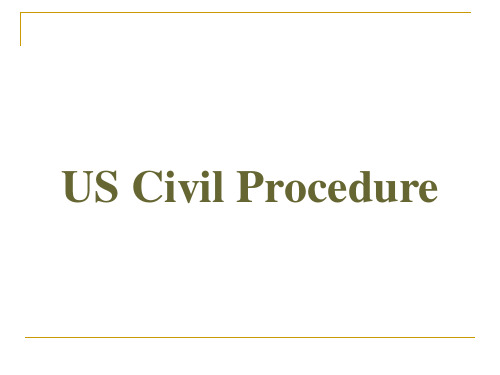
im
a claim by a defendant against a plaintiff in a lawsuit intending to off-set or reduce the amount of the plaintiff's original claim against the defendant Counterclaims did not exist at common law; they are an invention of modern civil procedure. Examples
Service of Process
Definition
the act of delivering legal documents (to a defendant) ★Typically, a summons must be served with a copy of the complaint upon the defendant. ★The plaintiff is responsible for having the summons and complaint served.
US Civil Procedure
The Pleading Stage
Complaint
General
A civil action is commenced by filing a complaint or petition with the court. ★The initial pleading in a civil lawsuit that seeks only money damages might be called (in most US courts) a complaint. ★The initial pleading in a lawsuit that seeks nonmonetary or equitable relief, such as a request for a writ of mandamus or habeas corpus, custody of a child, or probate of a will, is instead called a petition.
法律知识点总结英语
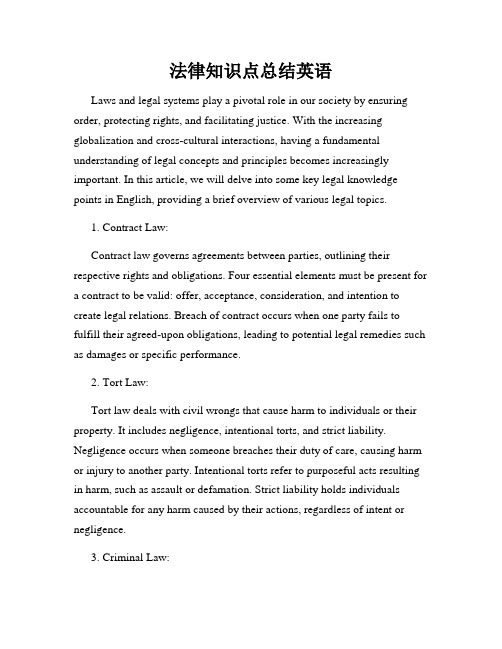
法律知识点总结英语Laws and legal systems play a pivotal role in our society by ensuring order, protecting rights, and facilitating justice. With the increasing globalization and cross-cultural interactions, having a fundamental understanding of legal concepts and principles becomes increasingly important. In this article, we will delve into some key legal knowledge points in English, providing a brief overview of various legal topics.1. Contract Law:Contract law governs agreements between parties, outlining their respective rights and obligations. Four essential elements must be present for a contract to be valid: offer, acceptance, consideration, and intention to create legal relations. Breach of contract occurs when one party fails to fulfill their agreed-upon obligations, leading to potential legal remedies such as damages or specific performance.2. Tort Law:Tort law deals with civil wrongs that cause harm to individuals or their property. It includes negligence, intentional torts, and strict liability. Negligence occurs when someone breaches their duty of care, causing harm or injury to another party. Intentional torts refer to purposeful acts resulting in harm, such as assault or defamation. Strict liability holds individuals accountable for any harm caused by their actions, regardless of intent or negligence.3. Criminal Law:Criminal law focuses on offenses against society at large. It distinguishes between felonies (serious crimes) and misdemeanors (lesser offenses). Criminal cases are prosecuted by the government, and if found guilty, defendants may face penalties ranging from fines to imprisonment. Important principles include presumption of innocence, burden of proof, and the right to legal counsel.4. Intellectual Property Law:Intellectual property refers to intangible creations of the mind, such as inventions, literary works, or symbols. Intellectual property rights, including patents, copyrights, and trademarks, protect creators' exclusive rights over their creations. Patent law safeguards new inventions and technological advancements, while copyright law preserves original creative works. Trademark law prevents unauthorized use of symbols or names that identify specific products or services.5. Constitutional Law:Constitutional law establishes a nation's fundamental principles and outlines the powers and limitations of its government. It safeguards individual rights and governs the relationships between citizens and the state. Key elements include separation of powers, checks and balances, and the protection of fundamental rights such as freedom of speech, religion, and the right to a fair trial.6. Family Law:Family law covers legal matters related to marriage, divorce, child custody, adoption, and domestic relationships. It ensures the protection andwelfare of family members. Family courts handle cases such as divorce settlements, child support, and visitation rights.7. Employment Law:Employment law regulates the relationship between employers and employees, encompassing various aspects such as hiring, termination, and workplace safety. It addresses issues such as discrimination, harassment, minimum wage, and working hours. Employment contracts and collective bargaining agreements establish the rights and obligations of both parties.8. Environmental Law:Environmental law focuses on the protection of natural resources, ecosystems, and the environment as a whole. It covers areas such as pollution control, conservation, and sustainable development. Environmental regulations aim to prevent and mitigate harmful impacts on the environment.9. International Law:International law governs the relationships between nations and provides guidelines for diplomatic interactions. It covers areas such as treaties, trade agreements, human rights, and armed conflicts. International courts, such as the International Court of Justice, settle disputes between countries.In conclusion, understanding these essential legal knowledge points in English can significantly benefit individuals in today's interconnected world. By familiarizing ourselves with these concepts, we can navigate legal issues, protect our rights, and contribute to a fair and just society.。
法律英语课件PPT课件

• but generally those entitled to practice before the highest court of a state may be admitted before the federal courts upon compliance with minor formalities.
三年大学 法学学位 书面考试
法律英语
9
• Almost all states, however, make use of the Multistate Bar Exam, a day-long multi-choice test, to which the states adds a day-long essay examination emphasizing its own law.
• 律师 • 法官 • 检察官 • 法学教师
法律职业
变换频繁 Harlan Fiske Stone
法律英语
3
法律英语
4
Part 1 The Bar
• Bar——法庭中将公众与法官、律师 及其他诉讼参与人分隔开的隔板。
• 后来用于通指法律职业或律师职业。
美国律师协会
(ABA)
法律英语
5
法律英语
6
• 律师通常在一个地区执业
• 可以代表当事人到其他州办理事务
• 只是在被准入的州获得执业资格
法律英语
15
• It is customary to retain local counsel for matters in other jurisdictions.
法律英语-课件内容重点摘录整理
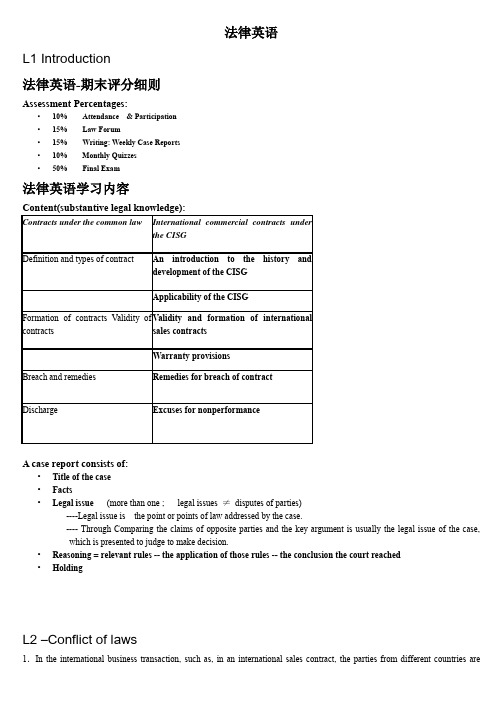
法律英语L1 Introduction法律英语-期末评分细则Assessment Percentages:•10% Attendance & Participation•15% Law Forum•15% Writing: Weekly Case Reports•10% Monthly Quizzes•50% Final Exam法律英语学习内容A case report consists of:•Title of the case•Facts•Legal issue (more than one ; legal issues ≠disputes of parties)----Legal issue is the point or points of law addressed by the case.---- Through Comparing the claims of opposite parties and the key argument is usually the legal issue of the case,which is presented to judge to make decision.•Reasoning = relevant rules -- the application of those rules -- the conclusion the court reached•HoldingL2–Conflict of laws1.In the international business transaction, such as, in an international sales contract, the parties from different countries areinvolved, and the contracting place may be different from the place of performance. If there arises dispute, what matters must the parties concern with?----Which country’s law will apply to the contract?----Where will the case be heard?2.To know what law applies to a contract, court will resort to conflict of law rules.( conflict of law is the area of law of each legal system which regulates how to deal with cases involving a foreign factor.)But application of conflict of law rules may bring about uncertainty and lack of predictability over how the case will be resolved, thus increase the risk of an international sale.3.To avoid uncertainty and unpredictability of conflict of law, many international contracts designate the parties’ cho ice of law which is to apply in case of dispute. That is, according to the rule of autonomy of the (party’s) will, the parties agree upo n which law will govern a contract and make a choice of law clause in their contract.4.the CISGL3 - History and Development of the CISGHow to deal with contract disputes in international transactions?----Where should the case be heard?----Which law should be the applicable law of the case?1. Autonomy of parties’ willWhen contract parties specify the choice of law and choice of forum, courts in most countries will require the parties to honor their contractual commitment.2. Conflicts of law3. The CISG✷About the CISG (p110 chapter4)1. Which organization drafted the CISG, UNIDROIT or UNCITRAL?2. W hat’s the main difference between the CISG and the other codes made by the UN?3. How did the CISG become the U.S. law?.✷T or F statements1. T --Treaties prevail over state statutes in the U.S..2. T -- The CISG prevails over the UCC.CISG (federal law)UCC (state statutes)PART ISPHERE OF APPLICATION AND GENERAL PROVISIONS(适用范围和准则)Chapter ISPHERE OF APPLICATIONArticle 1(1) This Convention applies to contracts of sale of goods between parties whose places of business are in different States:(a) when the States are Contracting States; or(b) when the rules of private international law lead to the application of the law of a Contracting State.(2) The fact that the parties have their places of business in different States is to be disregarded whenever this fact does not appear either from the contract or from any dealings between, or from information disclosed by, the parties at any time before or at the conclusion of the contract.(3) Neither the nationality of the parties nor the civil or commercial character of the parties or of the contract is to be taken intoconsideration in determining the application of this Convention.✷There are three conditions if The CISG is applicable:a -the commercial sale of goods;b- between two parties whose places of business are in different countries c-the places of business are located in countries that have ratified the convention.(How to decide “place of business”?)Article 2This Convention does not apply to sales:(a) of goods bought for personal, family or household use, unless the seller, at any time before or at the conclusion of the contract, neither knew nor ought to have known that the goods were bought for any such use;(b) by auction;(c) on execution or otherwise by authority of law;(d) of stocks, shares, investment securities, negotiable instruments or money;(e) of ships, vessels, hovercraft or aircraft;(f) of electricity.✷What sales are excluded from the CISG? And why? L4 –ContractPart1. A General Introduction to Contract⏹definition of a contractA contract is an agreement between competent parties based on the genuine assent of the parties, which is supportedby consideration and made for a lawful objective and in the form required by law, if any.⏹The basic requirements of a valid contract1. Agreement/genuine assent (a meeting of minds)2. Valid consideration----mutual promise3. Formation (offer + acceptance = contract)4. Capacity of parties to make a contract5. The legality of purpose or object of contract6. The form of contract must conform to the legal requirementsA valid contract should include all these essential elements and meet all these requirements.⏹Classification of contractWritten or oral contractsBilateral or unilateral contractsExpress or implied contractsExecuted or executory contractsValid, void, voidable contracts(P98—P104 Fundamentals of Business Law)According to their enforceability and validity, contracts can be classified into the following ones:1 _ Valid contracts __ has the necessary contractual elements, which is enforceable and has legal binding force.2 _ void contracts __ is not a contract at all. It has no legal effect. No parties should be bound by it.3 _ voidable contracts __ is a valid contract except that one party is entitled to rescind it.⏹Typical contract provisionsDuties and obligationsRepresentations and warrantiesTermination clausesRemedy clausesArbitration clausesPart2. Validity and Formation of International Sales Contracts (I)I. What does the CISG governII. Enforcement of illegal contractIII. The writing requirementIV. Problems of interpretationThe substantive study of the CISG( uniform code for the international contract of sale of goods)the CISG—balance : common law & civil lawI. What does the CISG govern? What is the CISG not concerned with? (Art. 4 ,5 & 11)⏹Only govern(1) Formation(2) Rights and obligations of the buyer and seller(3)The form of contract⏹Not govern(1) Validity(2) The property of the goods sold(3) Liability for death or personal injury caused by goods(4) Legal capacity of parties…II. Enforcement of illegal contractsContracts with illegal purposes have no legal effects. Such contracts are void and unenforceable.( Tarbert Trading, LTD. v. Cometals, Inc)III. The writing requirement (the form of the contract)1.The UCC (the 2003 proposed amendaments)2.The CISG3.Foreign Economic Contract Law of China (1985)4. New contract law of China (1999)Iv. Problems of Interpretation⏹Some general guiding principles of interpretation of contract:1. Plain English principle (the literal rule)2. The principle of four corners3. Types of writing --Handwritten words>Typed words>Printed words4. Standard form contractSuch contract is construed against the party who drafts it, otherwise exclusion clauses are construed against the party inserted them into the contract.5. Contracts affecting public interestsSuch contracts shall be construed in favor of the public.6. When one interpreter renders the contract valid and the other renders it invalid, the court usually adopt the one whichrenders the contract valid.7. Parol evidence rule(1) A. Where the parties have entered into a written sales contract that is intended to the final expression of the parties’agreement, the written agreement may not be contradicted by any prior agreement or contemporaneous oral agreement.( Where the sum payable is expressed in words and also in figures, and there is a discrepancy between the two,the sum denoted by the words is the amount payable.)B. Function of parol evidence:A. To clarify an ambiguityB. To prove additional terms of the agreement(2) Whether the CISG adopts the parol evidence rule?----No. Under the CISG in deciding the intend of the parties, all related circumstances may be considered. (Art. 8CISG)Whether the CISG allows to use parol evidence?----Yes. Under the CISG courts have wide leeway in using parol evidence in deciding the intend of the parties toa contract.8. In common law countries the courts often look to the past dealings of the parties and to trade usages for guidance ininterpreting contracts or filling the gaps.The CISG closely resembles the way trade usages are handled under American law. (Art.9 CISG)课堂Case analysis: Snow v. WinnFacts: A landlord sued his tenant in order to terminate the tenant’s lease. The landlord claimed the tenant hadbreached the lease agreement by using the premises for a convenience grocery store in violation of the“purpose clause” of the agreement. This clause stated that the tenant would use the premises for a gasolineservice station, car wash, and “associated activities”. The landlord alleged he had an oral understanding withthe tenant that the premises would not be used as a convenience store.Legal issue:Whether this oral testimony is admissible under the parol evidence?Reasoning:(1)The parol evidence rule states that…..(2) A.In this case, the parol evidence rule prohibits oral testimony about an integrated, written instrument.B. Furthermore, even if the phrase “associated activities” may be viewed as an ambiguity. Here the oraltestimony would be admissible to explain the meaning of such words.C. There was sufficient support for the court’s conclusion that retail gasoline operations are commonlyassociated with convenience store facilities and that parties intended to have good items sold on the premises.Decision: The court held this testimony was inadmissible.L5-8 Formation of ContractOffer + Acceptance = ContractPart1. OfferI.DefinitionsII. Basic elementsIII. Some problems about offerI.DefinitionsThe Common Law definition:An offer is a promise or commitment to perform or refrain from(制止)performing some specified act in the future.An offer must involve a definite promise by the offeror that he will bind himself if the exact terms specified by him are accepted.An offer may be made either to a particular person or to the public at large.The Chinese Law definition:An offer is a proposal with a view to entering into a contract with other parties. The proposal shall comply with the following stipulations:(1) Its contents shall be detailed and definite;(2) It indicates the intention of the offeror to be bound in case of acceptanceII. Basic elements = What are the basic elements to make an effective offer? P1161. Indicates or describes the goods;2. Expressly or implicitly specifies the quantity;3. Expressly or implicitly specifies the price for the goods.III. Some problems p1171. Public offerCan an offer addressed to the public (ads)?Different countries treat “public offer” differently:Germany— advertisements addressed to the public in general are mere invitations to deal.要约邀请the United States & China— do recognize specific advertisement that describe the goods、quantity、price my beconsidered an offerCISG— an advertisement or circular is not an offer unless the contrary is clearly indicated by the person making the proposal.2. Open price termIf the proposal is not definite enough, such as, no definite price terms, can it be taken as an offer? Yes, it can.(How to deal with “open price terms” in different legal systems?)CISG—look to the trade or to the market price of comparable goods to make its own determination of price, and all its other provisions will remain in effect. Art.553. Firm offersHow does the UCC define firm offer?–not be revoked if it is made in a signed writing or record that gives assurance that it will remain open for astated period of time , not to exceed three months.How does the CISG define firm offer-- firm offer are valid even if they are not in writing. Moreover, an offer may not be revoked if the offeree reasonably relies on the offer as being irrevocable and the offeree has acted in reliance on the offer.4. To withdraw an offer(1)How to withdraw the offer legally?(2)Whether an irrevocable offer can be withdrawn? Yes. Though irrevocable, may be withdrawn if the withdrawalreaches the offeree before or at the same time as the offer. ( Art.15)5. To revoke an offer(1) Suppose an offer has reached the offeree, but the offeror still wants to cancel it. How should he do?The revocation reaches the offeree before he has dispatched an acceptance. (Art.16)(2) Under what circumstances can an offer not be revoked?a. if it indicates, whether by stating a fixed time for acceptance or otherwise, that it is irrevocable; orb. if it was reasonable for the offeree to rely on the offer as being irrevocable and the offeree has acted inreliance on the offer.6. To terminate an offerAn offer, even if it is irrevocable, is terminated when a rejection reaches the offeror. -- Article 17True or False statements1.An offer becomes effective when the offeror dispatches it towards offeree.F- an offer become effective when reaches the offeree2.Before the offer reaches the offeree, it can be revoked by the offeror at will.F- two kind of exceptions –(Art.16)a b.3.An irrevocable offer cannot be withdrawn.F - Though irrevocable, may be withdrawn if the withdrawal reaches the offeree before or at the sametime as the offer. (Art.15)4. Even if an offer is irrevocable, it may be withdrawn.. T5. After an of fer reaches the offeree, it’s unlikely to make it invalid. FPart2. Acceptance⏹DefinitionAcceptance is a voluntary act (either words or conduct) by the offeree that shows assent (agreement) to the terms of an offer. The acceptance must be unequivocal(不含糊) and must be communicated to the offeror.⏹How to make a valid acceptance?Article 18(1) A statement made by or other conduct of the offeree indicating assent to an offer is an acceptance. Silence or inactivity does not in itselfamount to acceptance.(2) An acceptance of an offer becomes effective at the moment the indication of assent reaches the offeror. An acceptance is not effective if theindication of assent does not reach the offeror within the time he has fixed or, if no time is fixed, within a reasonable time, due account being taken of the circumstances of the transaction, including the rapidity of the means of communication employed by the offeror. An oral offer must beaccepted immediately unless the circumstances indicate otherwise.(3) However, if, by virtue of the offer or as a result of practices which the parties have established between themselves or of usage, the offereemay indicate assent by performing an act, such as one relating to the dispatch of the goods or payment of the price, without notice to the offeror, the acceptance is effective at the moment the act is performed, provided that the act is performed within the period of time laid down in thepreceding paragraph.True or FalseA makes an offer to B.1. B is not interest ed, but B’s friend, C, accepts the offer. Then a contract is concluded.F --Who can accept? ----I. the person to whom the offer is made. II. His agents2. Offeree says, “I accept the offer, but I wish I could have gotten a better price.” So there is an effective acceptance. F–虚拟语气表过去希望,但已不可能实现3. The offeree says, “I accept the offer, but only if I can pay on ninety days’ credit. Then this is a valid acceptance.F – It is a counter offer4. The offeree replies, “I accept; please send written contract.” This should be take n as an acceptance. ?5. The offeree replies, “I accept if you send a written contract.” This should be taken as an acceptance.?6.It is reasonable for the offeror to state, “By your silence and inaction you will be deemed to have accepted this offer.”-- Silence can never be an acceptance.(Silence can be an acceptance(1)when the parties have made such agreements(2)or (2) when the offeree has had prior dealings with the offeror.)CISG⏹D efinitionArticle 18.A statement made by or other conduct of the offeree indicating assent to an offer is an acceptance.⏹T hree basic elements to make a valid acceptance(1) Offeree (2) through a statement or other conduct (3) indication of assent to the offer⏹When the acceptance becomes effective?1. Under the common law, the acceptance becomes effective as soon as it is dispatched by the offeree, and then acontract is formed. ----the mailbox rule2. Under the civil law, the acceptance becomes effective when it reaches the offeror, and then a contract is concluded.----the rule of receipt of the letter of acceptance3. As to this point, CISG follows an approach somewhat different from the common law but similar to the civil law.----Article 18⏹CISG tries to compromise on two legal systemsCISG mainly adopts the approach of civil law, but it does absorb some elements of mailbox rule. – Art.16 / 18Art.18 An acceptance is effective when it reaches the offeror . ----receipt of acceptanceOne point which should be stressed is that offeree’s dispatch of an acceptance cuts off the offeror’s right to revoke the offer ----dispatch of acceptance⏹Whether a late acceptance is effective?1. There are two kinds of late acceptance.(1)The offeree makes an acceptance beyond the time limit for acceptance.That is, it is late when the offeree dispatches the acceptance.It is impossible for such acceptance to become effective except that without delay the offeror informs itseffectiveness.(2) The offeree dispatches the acceptance within the time limit for acceptance but the acceptance reaches theofferor beyond the time limit.That is, it is not late when the offeree dispatches the acceptance, and if its transmission had been normal, itwould have reached the offeror in due time.2. Such late acceptance is generally effective as an acceptance unless without delay the offeror informs the offereethat he considers his offer as having lapsed. ---- Art.21⏹Whether an acceptance can be withdrawn or revoked?CISG tries to achieve a balance in protecting the interests of two contracting parties.On one hand, CISG protects the interests of the offeror, who is entitled to withdraw or revoke the offer;On the other hand, CISG protects the interests of the offeree, who is also entitled to withdraw the acceptance.An offer may be revoked if the revocation reaches the offeree before he has dispatched an acceptance.The offeree’s dispatch of acceptances cuts off the offeror’s right to revoke the offer.⏹Whether a reply to an offer containing additional or different terms constitutes an acceptance?Material alteration: price, payment, quality and quantity of the goods, place and time of delivery, extent of one party’s liability to the other or the settlement of disputesCase analysis:A computer printer distributor in Argentina receives an offer by mail from Epson, a U.S. company, in reply toan inquiry. The offer arrives in Argentina on June 2. On June 12, the Argentinean company sends its acceptance by mail. On June 8, Epson sends a revocation of its offer that was received on June 13 in Argentina. The acceptance from Argentina arrives in the United States on June 17. Did a valid contract arise? When was the offer valid? When was the acceptance valid? When was the revocation valid? Decide the case under the common law and under the CISG.⏹Legal principles:1.An offer may be revoked if the revocation reaches the offeree before he has dispatched an acceptance.2.The offeree’s dispatch of acceptance cuts off the offeror’s right to revoke the offer.1. Mirror Image RuleThe rule requires that an offeree respond to an offer with an acceptance that is definite and unconditional, and that matches the terms of the offer exactly and unequivocally不含糊的.Most common-law and civil-law countries follow the mirror image rule. Under these laws, it is unlikely for an acceptance containing different or additional terms to become effective. Such acceptance is usually considered a counteroffer and thusa rejection of the original offer.2. The Battle of the FormsAs the mirror image rule requires that an acceptance be unconditional, both parties, buyer and seller, have to negotiate back and forth through standard business forms. The mirror image rule is the source of the battle of the forms.offer counteroffer counteroffer …The “last shot” principle:The form sent last in time will prevail others as the contract.3. Modification to Mirror Image RuleA. Modification under UCCB. Modification under the CISG----Art. 19C. Modification under China’s contract law---- Art.30, 31A -- Modification under UCCA. In the United States the mirror image rule has been changed by statute (the UCC) to deal with modern businesspractices.-- UCC 2-207(1) A written confirmation with additional or different terms operates as an acceptance unless…(It breaks the mirror image rule.)(2) Between merchants, an acceptance by a confirmation that contains new terms will produce a contract and newterms become a part of contract unless:The buyer (the offeror) expressly limits…The new terms materially alter…The buyer notifies the seller of an objection to the new termsB. How to deal with the additional or different terms(1)To become a part of the contractThe contract is concluded between merchants, containing those additional or different terms which only reflects minor differences (related to usual and customary usage in trade).(2) Not to become a part of the contractThe contract would arise without the new terms if the new terms reflect major differences( material alteration---- that is not commonly accepted in the trade and that would result in surprise hardship).B -- Modification under the CISG----Art. 191. The CISG compromises between the mirror image rule set out by the common and civil law and the UCC. Under theCISG:(1) the acceptance containing the new terms that do not materially alter the terms of the offer becomes a part of thecontract.---- close to the UCC(2) The purported acceptance containing the new terms that do materially alter the terms of the offer wouldconstitute a rejection of the offer and a counteroffer.---- close to the mirror image rule2. Unlike the UCC, the CISG goes further to define “material alteration” :T h e k e y e l e m e n t s t h a t w i l l m a t e r i a l l y a l t e r a c o n t r a c t: price, payment, quality and quantity of the goods, placeand time of delivery, extent of one party’s liability to the other or the settlement of disputesC -- China’s contract law---- Art.30, 31第三十条承诺的内容应当与要约的内容一致。
法律英语ppt
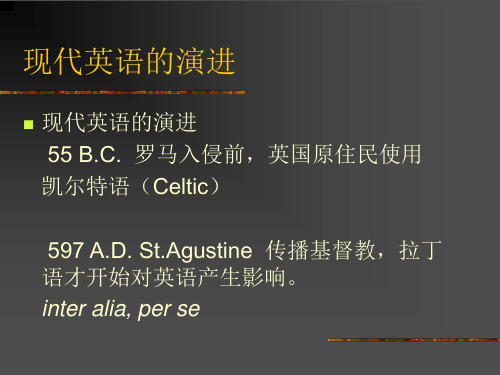
现代英语的演进
1066年,Norman(诺曼底人)从法国北部 入侵,征服了英格兰。(Justice, sovereign, court, parliament) parliament 后来,英国人主动从法语中扩充电磁, chauffer,bourgeois,bourgeoisie (小资)
法律英语的渊源
一、法律英语写作的语法与标点符号
3.3 “不写以BECAUSE, AND, BUT 打头的 句子。” 3.4 “少用一句话段落。” 3.5 “使用 I, ME, YOU” 代词时要谨慎考虑 表达的语气。”
一、法律英语写作的语法与标点符号
4. 疑难单词
二、法律英语写作文体
1.清晰 2. 一致 3. 法律效力
Covering Letters :
Briefly introduce yourself; what job you are applying for; where you saw the advert, etc. Give reasons why you are applying for this job in this organisation. Demonstrate your enthusiasm and understanding of the job/employer Explain why you are a good candidate; highlight important points from your CV; add any relevant information or explanations not in the CV.
General Advice :
Expect to spend several hours on an application It takes on average 2 minutes to read! Know yourself Know the employer – target CV to the j律英语写作的语法与标点符号
法律英语课堂PPT汇报(法律) -正本
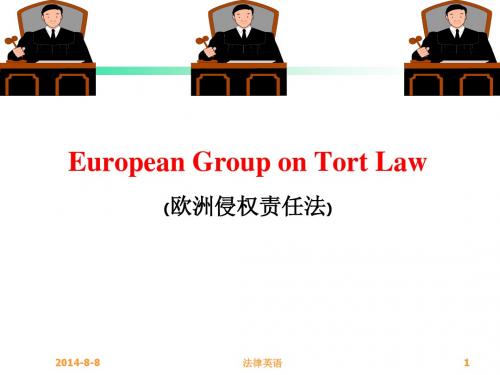
2014-8-8
法律英语
9
Causation
(2) If, in case of multiple victims, it remains uncertain whether a particular victim’s damage has been caused by an activity, while it is likely that it did not cause the damage of all victims, the activity is regarded as a cause of the damage suffered by all victims in proportion to the likelihood that it may have caused the damage of a particular victim.
damage from that time on.
Uncertain partial causation (不明确的部分原因 )
In the case of multiple activities, when it is certain that none of them has caused the entire damage or any determinable part thereof, those that are likely to have minimally contributed to the damage are presumed to have caused equal shares thereof.
2014-8-8
法律英语
法律英语Unit.ppt
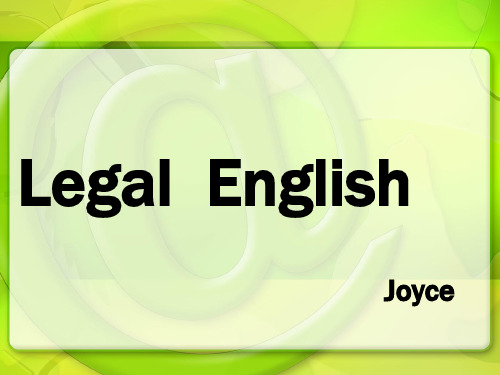
Crimes of Infringing Upon the Rights of the Person and the Democratic
Rights of Citizens侵犯公民人身权利、民主权利罪 The Crime of Encroaching on Property侵犯财产罪
Roles of Law
Guiding Judging Predicting Warning
Criminal Law
Three main points
Crime-------felony, misdemeanor Punishment------guidelines for sentencing Criminal liability(age 14)
What is law?
The characteristics:
1. Law is a social norm(准则) regulating social relations or human behaviors.
2. Law is a social norm reflecting the will of a state.
Legal English
Joyce
Characteristics of Legal English
1.Lengthy and complex sentences 2.Archaic words and expressions tin words and expressions 4.Passive consruction
我国刑法第13条规定:“一切危害国家主权、领土完 整和安全,分裂国家、颠覆人民民主专政的政权和推 翻社会主义制度,破坏社会秩序和经济秩序,侵犯国 有财产或者劳动群众集体所有的财产,侵犯公民私人 所有的财产,侵犯公民的人身权利、民主权利和其他 权利,以及其他危害社会的行为,依照法律应当受刑 罚处罚的,都是犯罪,但是情节显著轻微危害不大的, 不认为是犯罪。”
- 1、下载文档前请自行甄别文档内容的完整性,平台不提供额外的编辑、内容补充、找答案等附加服务。
- 2、"仅部分预览"的文档,不可在线预览部分如存在完整性等问题,可反馈申请退款(可完整预览的文档不适用该条件!)。
- 3、如文档侵犯您的权益,请联系客服反馈,我们会尽快为您处理(人工客服工作时间:9:00-18:30)。
Chapter oneTo be enforceable ,a contract must have:petent parties 有能力的当事人2.Legal subject matter 合法标的3.Legal consideration 合法对价4.Mutuality of agreement 合意5.Mutuality of obligation 互负义务Enforceable contract=offer+acceptance+consideration+intentOffer=intent+identified offeree+clear and definite terms+specific durationIntent=reasonable person+objective standardThe reception rule 到达主义The postal acceptance rule(mailbox rule)发出主义Detrimental reliance 不利益的信赖;致人损害的信赖由于一方当事人对他人的行为或陈述产生信赖,从而导致自己处于不利地位的,则该种信赖即属不利益的信赖。
不利益的信赖可以替代合同的对价,使某一单方的允诺成为可强制执行的合同。
Some criteria of irremediable damages一些不可弥补损害的标准1.monetary damages will not sufficiently reimburse the nonbreaching party 金钱赔偿不足以补偿未违约方2.The contract was for personal services unobtainable elsewhere这是一份别处无法获得的个人服务合同3.The property/service is rare or unique财产或者服务是罕见的或者唯一的4.The balance of the hardship to both parties has been considered双方都考虑到履约和损失的平衡性Additional terms in acceptance or affirmation1.a definite and seasonable expression of acceptance or a written confirmation which is sent within a reasonable time operates as an acceptance even though it states terms additional to or different from those offered or agreed upon ,unless acceptance is expressly made conditional on assent to the additional or different terms.一个明确和合理的承诺的表达或者书面的确认书在合理的时间内作为承诺发出,即使它表述额外的条款或者不同于要约或者所商定的,除非承诺是明确附加了条件对于那些附加条款或者不同条款。
2.The additional terms are to be constructed as proposals for addition to the contract. Between merchants such terms become part of the contract unless附加条款将作为对合同的补充条款提出建议。
在商人之间,这些条款成为合同的一部分A.the offer expressly limits acceptance to the terms of the offerB.They materially alter itC.Notification of objection to them has already been given within areasonable time after notice of them is received.3.Conduct by both parties which recognizes the existence of a contract is sufficient to establish a contract for sale although(但是)the writings of the parties do not otherwise establish a contract. In such case the terms of the particular contract consist of(包括)those terms on which the writings of the parties agree,together with any supplementary terms incorporated under any other provisions of this Act.双方当事人承认存在合同的行为,足以成立买卖合同,但当事人的书面文件另有约定的除外。
在这种情况下,特定合同的条款包括双方书面同意的条款,以及根据本法任何其他规定合并的任何补充条款。
SilenceNot normally considered acceptance,although there are exception to the rule.比如交易习惯。
What should be included in a contract?1.Heading 标题2.Exordium 绪论导论3.Recitals 详述(合同成立的背景信息)4.Transition 解释合同中用语5.Definition 定义,阐释(合同条款的详细解释)6.Operative provisions 执行条款(合同的主体)7.Interpretation 解释8.Conditions precedent 先决条件9.Other operative clauses 其他执行条款10.Testimonium clause 证明条款11.Schedules 附录Chapter twoThe federal government with the limited powers(联邦政府的有限权利):1.impose federal taxes 征收联邦税2.Wage war 发动战争Regulate interstate and foreign commerce 管理州际和国外商业3.Make treaties with foreign government 和外国政府缔结条约Three branches of the federal government1.federal system of courts2.Executive branch3.Legislative branchBicameral(两党制):senate参议院and the house of representative众议院Republican party 共和党and democratic party民主党The united kingdom:The house of lords and the house of commonsThe labor party (工党)and the conservative party(保守党)Series of checks and balances制衡机制Judicial review 司法审查Three concepts inherited from british1.supremacy of law 法律至上2.Precedent 遵循先例3.Adversary proceeding 对抗程序Stare decisis=non quieta movereAttorneys to courses of actions代理诉讼的律师1.Reconcile(核对)the facts of the current case with prior decision2.Attempt to convince the judge to repudiate(否认)a prior decisionHolding:binding authorityDicta:persuasive authorityClassification of law in the united statesw and equity2.Substantive and procedural law3.Public law and private lawIf the legal remedies are sufficient,equitable remedies can not be usedProcedural law 程序法1.issue of jurisdiction管辖权问题2.Pretrial actions 审前行为3.Admissibility of evidence 证据的可采性4.Appeals 上诉Substantive law 实体法1.Torts 侵权2.Products liability 产品责任3.Corporation 法人4.Contracts 合同Public law 公法1.constitutional law 宪法2.Administrative law 行政管理法bor law 劳动法4.Trade regulation 贸易规章,贸易条例5.Criminal law 刑法6.Tax law 税法Private law 私法1.civil law(contracts,family law,property law) 民法mercial law(negotiable instrument,sales,secured,transactions) 商法3.Business enterprises(agency,corporations,partnerships)商业企业、工商企业Chapter three legal authorities一、Statute 制定法、单行法precedent判例Essential terms1.Plaintiff2.Defendant3.Appellant4.Appellee5.Jurisdiction管辖权6.remand发回重审(committed a procedural error;failed to admit evidence or witness...)7.Cert.denied拒绝调卷令(certiorari denied)8.Writ of certiorari9.Cause of action诉由10.Refer to 设计,指的是,参考,适用于11.Initiate 最初的,开始12.Articulate 明确有力的表达13.Rationale 原理的阐释,解释,基本原理14.Citation 索引号15.State reporters 州判例集16.Regional reporters 联邦判例集17.U.S. supreme court reporters 美国最高法院判例集18.Atlantic reporters19.Pacific reporters20.Co. Corporation 公司,法人21.Descriptors 描述符Secondary sourcese.g.corpus juris secundum[C.J.S.] 博士论文汇编American jurisprudence[Am.Jur.] 美国法释义全集Federal and state digests(汇编,文摘)Annotated statute books 注释法典State legal system1.trial court 初审法院一审法院Jury-unanimous verdict 一致裁断除非当事人双方同意多数裁断majority verdict2.Appellate court 上诉法院Bank of judge 全体法官,审判庭,合议庭Appellant v. appelleePetitioner v. respondentIssue of law 法律问题Prejudicial error 造成损害的错误法庭在诉讼中所犯的给一方当事人造成损害的法律错误,可作为上诉法院撤销原判的理由。
